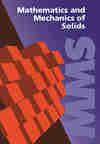Critical velocities of a three-layer composite tube incorporating the rotary inertia and material anisotropy
IF 1.7
4区 工程技术
Q3 MATERIALS SCIENCE, MULTIDISCIPLINARY
引用次数: 0
Abstract
Critical velocities of a three-layer composite tube subjected to a uniform internal pressure moving at a constant velocity are obtained in closed-form expressions. A Love–Kirchhoff thin shell model including the rotary inertia and material anisotropy effects is used in the formulation. The composite tube is made of three perfectly bonded cylindrical layers of dissimilar materials, each of which can be orthotropic, transversely isotropic, cubic or isotropic. Closed-form formulas for the critical velocities are first derived for the general case by incorporating the effects of material anisotropy, rotary inertia and radial stress. Specific formulas are then obtained for composite tubes without the rotary inertia effect and/or the radial stress effect and with various types of material symmetry for each layer as special cases. It is also shown that the current model for three-layer tubes can be reduced to those for single- and two-layer tubes. To illustrate the newly derived formulas, an example is provided for a composite tube consisting of an isotropic inner layer, an orthotropic core, and an isotropic outer layer. All four critical velocities of the composite tube are computed using the new closed-form formulas. Three values of the lowest critical velocity of the three-layer composite tube are analytically obtained from three sets of the new formulas, which agree well with the value computationally determined by others.包含旋转惯性和材料各向异性的三层复合管的临界速度
通过闭式表达式获得了三层复合管在均匀内压作用下匀速运动的临界速度。计算中使用了 Love-Kirchhoff 薄壳模型,其中包括旋转惯性和材料各向异性效应。复合管由三层完全粘合的异种材料圆柱层组成,每层材料可以是正交各向同性材料、横向各向同性材料、立方体材料或各向同性材料。通过将材料各向异性、旋转惯性和径向应力的影响考虑在内,首先得出了一般情况下临界速度的闭式公式。然后,针对没有旋转惯性效应和/或径向应力效应的复合管,以及作为特例的各层材料对称的各种类型,得出了具体公式。计算结果还表明,目前的三层管模型可以简化为单层和双层管模型。为了说明新推导出的公式,以由各向同性内层、正交核心和各向同性外层组成的复合管为例进行说明。使用新的闭式公式计算了复合管的所有四个临界速度。从三组新公式中分析得出了三层复合管的三个最低临界速度值,这些值与其他人通过计算确定的值非常吻合。
本文章由计算机程序翻译,如有差异,请以英文原文为准。
求助全文
约1分钟内获得全文
求助全文
来源期刊

Mathematics and Mechanics of Solids
工程技术-材料科学:综合
CiteScore
4.80
自引率
19.20%
发文量
159
审稿时长
1 months
期刊介绍:
Mathematics and Mechanics of Solids is an international peer-reviewed journal that publishes the highest quality original innovative research in solid mechanics and materials science.
The central aim of MMS is to publish original, well-written and self-contained research that elucidates the mechanical behaviour of solids with particular emphasis on mathematical principles. This journal is a member of the Committee on Publication Ethics (COPE).
 求助内容:
求助内容: 应助结果提醒方式:
应助结果提醒方式:


